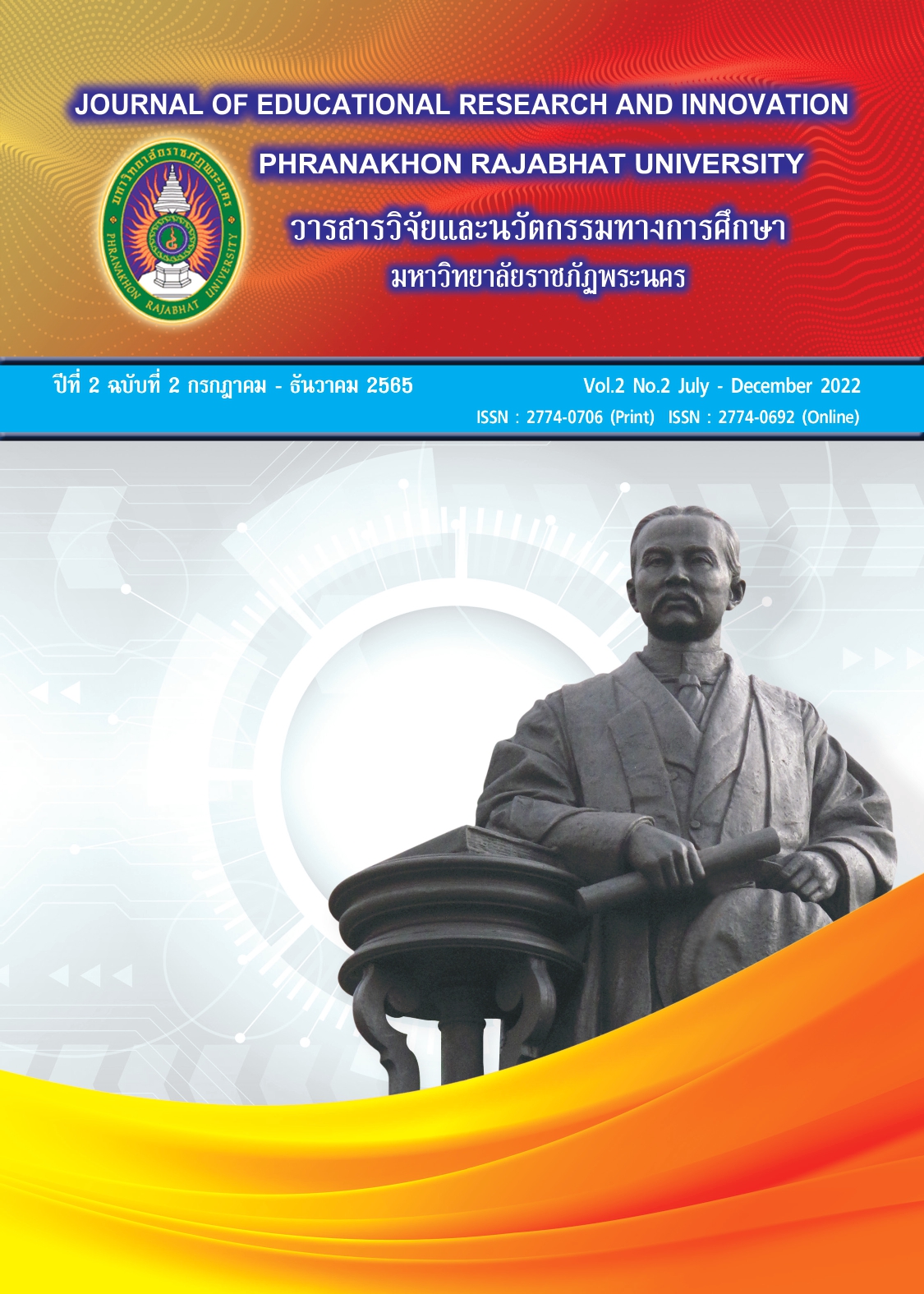การพัฒนาพฤติกรรมความมีวินัยในตนเองของนักเรียนชั้นประถมศึกษาปีที่ 2 โดยใช้นิทานคุณธรรม
Main Article Content
บทคัดย่อ
การวิจัยครั้งนี้มีวัตถุประสงค์เพื่อเปรียบเทียบพฤติกรรมความมีวินัยในตนเองของนักเรียนชั้นประถมศึกษาปีที่ 2 ก่อนเรียนและหลังเรียนโดยใช้นิทานคุณธรรม และเพื่อศึกษาความพึงพอใจของนักเรียนชั้นประถมศึกษาปีที่ 2 ที่มีต่อการเรียนรู้โดยใช้นิทานคุณธรรม ประชากรที่ใช้ในการวิจัย คือ นักเรียนชั้นประถมศึกษาปีที่ 2 โรงเรียนวัดแป้นทอง (สามวาวิทยา) สังกัดสำนักการศึกษากรุงเทพมหานคร จำนวน 138 คน กลุ่มตัวอย่างในการวิจัย คือ นักเรียนชั้นประถมศึกษาปีที่ 2/4 โรงเรียนวัดแป้นทอง (สามวาวิทยา) สังกัดสำนักการศึกษากรุงเทพมหานคร ในภาคเรียนที่ 1 ปีการศึกษา 2565 จำนวน 30 คน เครื่องมือที่ใช้ในการวิจัยประกอบด้วย แผนการจัดการเรียนรู้โดยใช้นิทานคุณธรรม จำนวน 8 แผน แบบประเมินพฤติกรรมความมีวินัยในตนเอง และ แบบประเมินความพึงพอใจ สถิติที่ใช้ในการวิเคราะห์ข้อมูล ได้แก่ ค่าเฉลี่ยและส่วนเบี่ยงเบนมาตรฐาน
ผลการวิจัยพบว่า พฤติกรรมความมีวินัยในตนเองของนักเรียนชั้นประถมศึกษาปีที่ 2 ที่มีต่อการจัดการเรียนรูโดยใช้นิทานคุณธรรม ก่อนเรียนอยู่ในระดับน้อย และหลังเรียนอยู่ในระดับมากที่สุด ซึ่งความพึงพอใจของนักเรียนชั้นประถมศึกษาปีที่ 2 ที่มีต่อการเรียนรู้โดยใช้นิทานคุณธรรมอยู่ในระดับมากที่สุด
Article Details
เอกสารอ้างอิง
Bhanthumnavin, D. (1995). Psychology of self-discipline. Guide, 18(9), 58-71. (In Thai)
Dong Ngaew, S. (2019) The development of self-discipline in student responsibility by using 1Be 4Good Model, Ban Nak Community School, Changhuadut Songkhla Year of study 2019-2020. (Master thesis). Songkhla University, Songkhla.
Intharatsami, P., & Intharatsami, P. (2019). The Development of Moral Story Books to Improve Self-Discipline of Preschool Children. Journal of research for Learning Reform, 2(2), 43-54. (In Thai)
Joy, P. (2014). Aesop’s Fable. Retrieved from https://joypontip2539.wordpress.com [2022, 9 Oct.]
Koomthanom, N. (2014). Effect of organizing non-formal education activities to enhance self-discipline of youth. (Master Thesis). Chulalongkorn University, Bangkok.
Kowtrakul, S. (2016). Educational Psychology (12th ed.). Chulalongkon University Press.
Noidad, S. (2012). A Study of Young Children Self Discipline Behaviors Resulted from Project Approach Experiences. (Master thesis). Srinakharinwirot University, Bangkok.
Panwang, W., Maneekul, J. and Mangkhang, C. (2019). The Learning Management Using Moral Folktales to Promote Good Citizenship of Early Childhood. Journal of Graduate MCU KhonKaen Campus, 6(2), 253-270.
Santhip, T. (2016) Students self discipline of student nikom sang ton eng chang watrayong 4 school rayong primary educational service area office. (Master Thesis). Burapha University, Chonburi.
Srisaat, B. (2012) Self-discipline and related research. Journal of Educational Measurement Mahasarakham, 17(1), 3-15. (In Thai)
Srisaat, B. (2018). Self-discipline and related research. Journal of Educational Measurement Mahasarakham University, 23(1) 3-15
Srisaat, B., & Nilkaew, B. (1997). Preliminary research. (6th ed). Maha Sarakham. Srinakharinwirot University.
Srisaat, B. (2018) . Population reference when using the estimating scale tool on a sample. Journal of Educational Measurement Srinakharinwirot University, Mahasarakham, 2018(3), 22-25
Tangkananurak, S., Wimonnott, O. & Nachorn, K. (2016). Research and Development Model for Developing Responsibility , Self control and Self Discipline of Elementary school students Prathom 5 and 6 of Chulalongkorn University Demonstration Elementary School. (Research report)
Tonglad, S. (2021). Developing Guidelines for Strengthening Students' Self-Discipline Under the Office of Kalasin Primary Education Area 3. (Master Thesis). Mahasarakham University, Mahasarakham University, 17(1), 3-15. (In Thai)
Urabunnualchat, W. (2006). Training program development According to the Trisikkha guidelines to strengthen the self-discipline of grade 5 students. (Master Thesis). Chulalongkorn University, Bangkok.
Wongsen, W. (2022, 08 Aug.). Problem of self-discipline behavior Teacher. Wat Panthong School (Samwa Witthaya).


